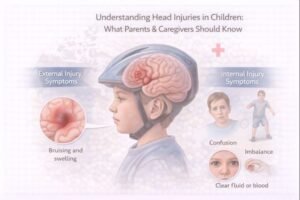Understanding Head Injuries in Children: What Parents & Caregivers Should Know (Canada)

This content is for educational awareness only and not a substitute for medical assessment, diagnosis, or emergency care.
Common Causes of Head Injuries
Head injuries in children can result from:
-
Sports and recreation
-
Cycling or scooter collisions
-
Falls at home or playgrounds
-
Motor vehicle incidents
-
Struck-by-object injuries
Many serious head injuries have delayed symptoms. If a child shows concerning signs, or if there is uncertainty, it is safest to have them assessed by a healthcare professional.
External (Scalp) Injuries
An external injury affects the scalp but not the skull or brain directly. Because the scalp has abundant blood vessels, bruising and bleeding can look dramatic.
Possible external signs include:
-
Redness or swelling at the impact site
-
Bruising
-
Bleeding if the skin is broken
-
Localized pain or tenderness
Most mild external injuries do not cause further symptoms. It is recommended to monitor the child closely for the next 24 hours, as symptoms can evolve.
Internal Injuries & Concerning Symptoms
A forceful impact can affect the brain tissue and blood vessels inside the skull. Symptoms vary and may appear immediately or hours later.
Warning signs may include:
-
Persistent headache
-
Vomiting
-
Difficulty walking or balance changes
-
Slurred speech or confusion
-
Unequal or abnormal pupils
-
Blurry or unfocused vision
-
Drainage of clear fluid or blood from the nose or ears
-
Unusual sleepiness or loss of consciousness
If any of these occur, seek prompt medical evaluation. In Canada, parents often contact provincial health advice lines (e.g., HealthLink or Telehealth services) or go directly to an emergency department depending on severity.
Concussion in Children
A concussion is a type of brain injury that can follow a blow to the head or a sudden jolt to the body.
Common concussion symptoms include:
-
Headache
-
Dizziness
-
Nausea or vomiting
-
Light/noise sensitivity
-
Fatigue
-
Irritability or mood changes
-
Difficulty concentrating or changes in memory
Symptoms can appear immediately or develop gradually over days. Medical assessment is recommended anytime concussion is suspected.
Prevention & Canadian Safety Considerations
Preventing head injuries is a shared responsibility among families, schools, and sport organizations. Strategies include:
-
Properly fitted helmets for cycling, skiing, skating and contact sports
-
Safe playground surfaces and supervision
-
Age-appropriate sports rules and coaching
-
Concussion protocols in organized sports (common across Canada)
These prevention measures also overlap with broader first aid and workplace safety principles, emphasizing risk reduction, hazard awareness, and early response.
Where First Aid Training Fits In
Basic first aid training helps caregivers and educators recognize concerning symptoms, monitor for delayed changes, and respond while waiting for medical care. Many workplaces and childcare settings in Canada include head injury protocols within their safety plans, alongside CPR and AED training.
Educational Disclaimer
This article is intended for general learning and safety awareness only. It does not provide medical advice, diagnosis, or treatment. If a head injury is suspected or symptoms worsen, seek medical evaluation or emergency care.
